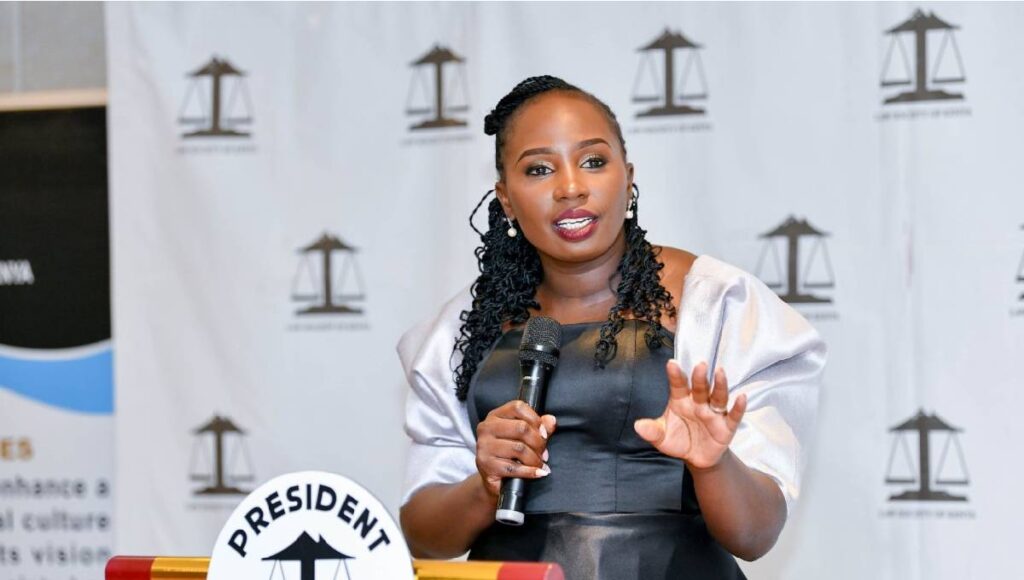
LSK President fFaith Odhiambo. Photo/Courtesy
By Newsflash Writer
Law Society of Kenya (LSK) President Faith Odhiambo has resigned from the government’s newly formed Panel of Experts on Compensation of Victims of Protests and Riots, less than a month after her appointment by President William Ruto.
Odhiambo, who had been named vice chairperson under the leadership of legal scholar Prof. Makau Mutua, tendered her resignation quietly, without a formal public statement. Her move, however, has sent ripples through Kenya’s legal and political circles—reviving questions about the independence of institutions meant to hold the government accountable.
Controversial appointment from the start
From the day of her appointment, Odhiambo’s inclusion on the 16-member panel drew sharp criticism. Many argued that as head of the LSK—a body often seen as the moral and legal conscience of the nation—her participation in a government-led committee presented a clear conflict of interest.
The panel’s mandate is to identify and compensate victims of political protests and riots, including those injured or killed in confrontations with police during recent demonstrations. But to critics, Odhiambo’s role risked blurring the line between defending the public and endorsing a government initiative that itself may face scrutiny.
“How can the president of the LSK, who should be defending victims in court, sit in a government panel investigating the same?” asked lawyer and governance analyst Charles Kilonzo. “It undermines the independence and credibility of the LSK.”
Read More: Arrested Standard journalist Collins Kweyu turns state witness
Pressure mounts from within the legal fraternity
Sources within the legal community say Odhiambo faced mounting pressure from LSK members, human rights groups, and fellow lawyers to reconsider her involvement. Some argued that the panel’s formation was more about political optics than justice.
“She was in an impossible position,” said a senior Nairobi advocate who requested anonymity. “Remaining in that panel would have meant compromising her role as a watchdog. Resigning restores her credibility.”
While Odhiambo has not publicly explained her reasons, her departure signals unease within the professional community over the government’s handling of protest-related accountability.
Government faces crisis of confidence
The panel, unveiled by State House as a “healing mechanism,” was designed to compensate victims, restore public trust, and demonstrate the government’s commitment to justice. Yet, Odhiambo’s exit raises doubts about its legitimacy and effectiveness.
“It’s a serious blow,” admitted a senior government official familiar with the process. “Faith gave the panel a face of neutrality. Without her, it risks being dismissed as a political tool.”
President Ruto’s administration has faced growing criticism for its handling of nationwide protests earlier this year, where dozens were killed and hundreds injured. Human rights groups accuse police of using excessive force and the state of failing to hold perpetrators accountable.
The government insists the compensation panel is part of a wider reform agenda aimed at reconciling with victims. But many now see it as an empty gesture.
Read More: Ruto urges bold UN reforms to stay relevant in global order
Calls for transparency and justice
Civil society leaders are demanding transparency on how the panel will proceed after Odhiambo’s resignation. Amnesty International Kenya said the development should prompt “a re-evaluation of the panel’s structure, mandate, and independence.”
“The resignation highlights the trust deficit between the government and victims’ families,” said Amnesty Kenya’s executive director Irũngu Houghton. “True justice cannot be achieved if those tasked with oversight are perceived as politically compromised.”
As the government prepares to name Odhiambo’s replacement, attention shifts to whether the panel can regain public confidence—or whether it will fade into another forgotten committee.
For Odhiambo, her exit reaffirms her reputation as a lawyer who chooses principle over position. For the victims still waiting for compensation and justice, it is another reminder that Kenya’s road to accountability remains long and uncertain.



